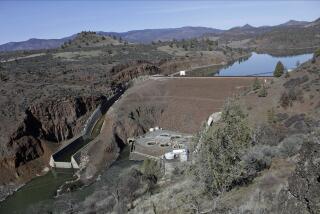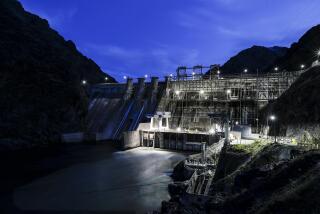BOOK REVIEW / NONFICTION : Epic Story of a Magnificent River Tamed : NORTHWEST PASSAGE: The Great Columbia River <i> by William Dietrich</i> ; Simon & Schuster $26, 448 pages
- Share via
I have been reviewing books regularly in these pages for nearly 10 years now--several hundred books in all--and in that time I cannot recall many books that so gripped my attention and moved me as William Dietrich’s “Northwest Passage.”
It is a marvel of history, nature writing, politics and common sense, extensively researched, lovingly written and splendidly woven together in an epic story of a magnificent river and humanity’s conquest of nature.
The Columbia River--the great Columbia River--has the second largest flow of any river in the United States, and it may be the most impressive of all. The tamer Mississippi runs down the center of the United States and boasts at least five major cities along its banks. The wilder Columbia is tucked into the northwest corner of the country and has just one big city--Portland, Ore. And even Portland is more centered on the Willamette than on the Columbia a few miles away.
In this century, Dietrich writes, “the mighty Columbia was not just harnessed, it was utterly transformed from an unruly river into a series of placid pools: the most heavily dammed river system and the greatest producer of hydroelectricity in the world.
“It is beautiful in its placid way, undeniably efficient, stupendously expensive, eerily quiet . . . and as deliberately boring as a freeway.” But before he gets to the 20th Century, Dietrich, a Pulitzer Prize-winning reporter at the Seattle Times, tells the long story of the great river, the Native Americans who lived beside it for millennia and the Europeans who came upon it from the sea and over land about 200 years ago.
In an age when we fly across the continent effortlessly in a few hours, it is thrilling to read about and recall the tremendous difficulty of exploring and mapping this country. It was not until the 1840s that people began crossing the continent by wagon. The trip took months.
Just finding the Columbia was a major effort. It did not give itself up without a fight. From the ocean, getting through the mouth of the river is a hazardous business that claimed many lives.
John Jacob Astor (for whom Astoria, Ore., is named) played a major role in opening the river to navigation for his fur business.
Lewis and Clark, dispatched by Thomas Jefferson, “transformed the Pacific Northwest into a place of reality instead of fantasy, a destination that could demonstrably be reached and someday developed.” But all of this is prelude to Dietrich’s main story, which is the total transformation of the river to provide electricity and reliable navigation. He quotes one observer as saying, “We gave up the river to get a non-polluting, renewable energy source.”
Dietrich claims not to make any judgment about whether this was or was not a good trade. What concerns him most, he says, is that there was never any argument about it, never any debate. The other side, if it existed, was simply not heard. No thought was given to what was being lost, to the Native Americans, whose ancestral lands were being flooded, or to the salmon, which in time would be nearly wiped out.
Humanity, full of the can-do hubris that is a legacy of the Industrial Revolution, simply came in and did it. In the 1940s, even Woody Guthrie, the folk singer, was enlisted by the government to write songs in praise of the dams on the Columbia.
Guthrie, you recall, was a left-wing socialist who today would probably be lying down in front of the bulldozers in an effort to stop such construction.
But those were different times. Guthrie, Dietrich writes, “saw a government using the Columbia River to try to correct the excesses of the Industrial Revolution, to truly redistribute wealth and curb fossil fuel pollution, to harness a ‘wild and wasted stream.’ He saw Grand Coulee Dam as government at its best, a prophecy of what socialism could accomplish when it triumphed.”
In one month, Guthrie wrote 26 songs, including “Roll On, Columbia” and “Pastures of Plenty.” He was paid $266.66. Dietrich leaves open the question of what would have happened if we knew then what we know now.
Would a robust environmentalist movement have made a difference or would the body politic still choose cheap electricity over a spectacular river?
More to Read
Sign up for our Book Club newsletter
Get the latest news, events and more from the Los Angeles Times Book Club, and help us get L.A. reading and talking.
You may occasionally receive promotional content from the Los Angeles Times.










